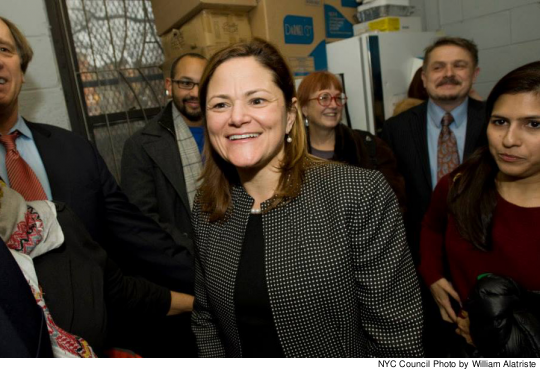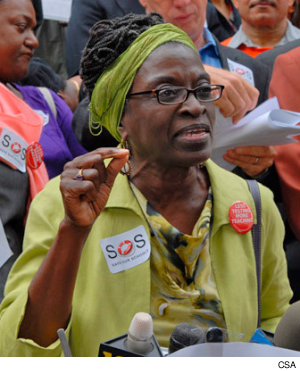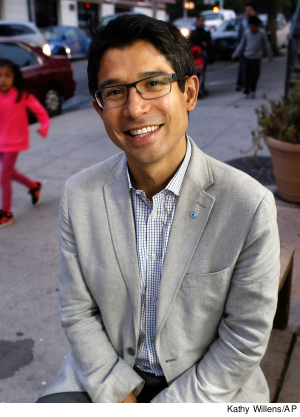Last November, voters made clear that they want New York City to head in a new direction. This was true not only in the mayor’s race, where Bill de Blasio won decisively with his focus on economic inequality, it also shaped the results in elections for City Council. With 22 of its 51 members newly elected, the council is more progressive than at any time in recent memory – and PSC activists say this will be good for CUNY.
 |
In January, the political consequences of November’s election quickly made themselves felt, beginning with Melissa Mark-Viverito’s election as City Council Speaker on January 8. Mark-Viverito’s victory signaled the rising influence of the council’s Progressive Caucus, which grew from 11 to 20 members once the new council was sworn in, and it marked the first time that a Latina has held citywide office.
After Bloomberg
“This is a historic opportunity to change the politics of New York City,” said Paul Washington, an activist with the PSC Legislative Committee and vice chair of the PSC’s Higher Education Officer Chapter. “Melissa has a philosophical core that’s about protecting the working and middle classes in New York that were devastated by Bloomberg.”
The council’s choice of Mark-Viverito, wrote New York Daily News columnist Juan Gonzalez, “sent a clear signal, especially to our business and real estate barons – the 1% who had everything their way during the Bloomberg era – that all branches of city government are now lined up behind Mayor de Blasio’s promise to end the ‘tale of two cities.’”
PSC members who’ve known Mark-Viverito as their councilmember were also pleased with the outcome. Blanca Vásquez, an adjunct lecturer in film and media studies at Hunter, lives in Manhattan Valley, which Mark-Viverito represented until 2013. Vásquez told Clarion that Mark-Viverito helped mediate a land use dispute between a powerful land owner and the Manhattan Valley Preservation Coalition, of which Vásquez is a member.
“I tend to be pretty skeptical of elected officials, but we grew to really trust her,” Vásquez told Clarion. “She is direct, honest and you can have a serious conversation with her.”
Others in the district were also pleased. “She’s a fighter. She has always been there for us,” said Elizabeth Owens who, lives in the South Bronx and is a member of the grassroots group VOCAL-NY. Owens was among a couple dozen community activists who joined PSC members to watch Mark-Viverito’s election as speaker by video stream, after the council chambers had filled to capacity.
Mark-Viverito’s victory marked the first time in many years that selection of the council speaker had not been dominated by the Democratic Party’s county bosses. She was opposed by the regular county organizations in the Bronx and Queens, and gained the Brooklyn organization’s support relatively late in the game. “Ideology trumped the machines,” commented PSC Legislative Committee member Alex Vitale. “This time, the Progressive Caucus was able to pull people away from their county machines to support a candidate based on her overall political principles.”
Mark-Viverito’s Background
Mark-Viverito, 44, is a native of Puerto Rico who moved to New York as a college student, earning her bachelor’s degree at Columbia University and a master’s in public administration at Baruch College. After working as an organizer at 1199SEIU Healthcare Workers East, she was first elected to the council from East Harlem in 2005. During her time on the council she has gained a reputation as a staunch defender of affordable housing and of workers’ rights. Washington says that Mark-Viverito understands that CUNY has long been a key to opportunity for students of color. “Only benefits can come from that,” he told Clarion.
A close ally of Mayor Bill de Blasio, Mark-Viverito is co-chair of the council’s Progressive Caucus, established in 2010 with strong backing from many of the city’s unions, including the PSC. In the wake of her election as speaker, Mark-Viverito signaled the council’s new direction by quickly moving to advance a bill that will expand the City’s new paid sick-day law, covering more workers than a compromise measure grudgingly accepted last year by then-Speaker Christine Quinn.
Mark-Viverito also appointed progressive allies to a number of key committee chairmanships, tapping Brooklyn Councilmember Inez Barron to chair the council’s Committee on HIgher Education. Barron comes to the position with 36 years of experience in education as a classroom teacher, assistant principal and administrator. She served five years in the State Assembly before winning a council seat in November, in the East New York district that had been represented by her husband, Charles Barron. Like the two previous higher education committee chairs, Charles Barron and Ydanis Rodríguez, Inez Barron is an outspoken supporter of increased funding for CUNY.
 |
“CUNY colleges have been underfunded and understaffed for years,” she told Clarion. Barron says she supports Mayor de Blasio’s campaign promise to redirect $150 million in corporate tax breaks to greater City support for CUNY colleges. She says she herself would not have received a college degree without access to CUNY.
“I was able to attend CUNY because it was free,” said Barron, who graduated from Hunter College in 1967 and went on to earn a master’s degree from Bank Street College of Education. As committee chair, she said she would like to examine ways to reduce the amount of money that students must spend on textbooks.
“I’m concerned about Pathways,” Barron added.” I’ve heard from instructors that it deprives students of the fullness of their education.” She also expressed concern about the poor preparation of so many New York City public school graduates for college-level work; on both topics, she is especially interested in the views of those who are closest to the classroom.
 |
Other new committee chairs also have extensive personal experience with the issues their committees focus on. Daneek Miller, former president of Amalgamated Transit Union Local 1056, will head the Committee on Civil Service and Labor. Carlos Menchaca, the son of Mexican immigrants, will head the Immigration Committee. Daniel Dromm (D-Queens), a former school teacher and UFT activist, will head the Committee on Education, while Ritchie Torres, who grew up in a New York City public housing development, will head the Committee on Housing and Buildings.
“The PSC and other unions worked hard for a more progressive city government and are now seeing the results,” said PSC First Vice President Steve London. “CUNY’s poised to benefit.”

